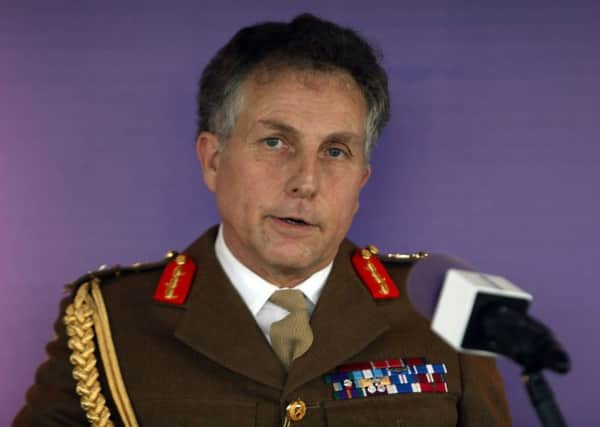General's Troubles probe remarks '˜a boon to those who want balance'


Mr Beattie said that General Sir Nick Carter’s comments were a welcome reminder of the “remarkable job” done by troops during the decades of paramilitary bloodshed.
By contrast, Sinn Fein reacted angrily, issuing a statement calling the comments “extremely insulting”, and challenging him to provide evidence of what he means by “vexatious claims”.
The Alliance Party also condemned his comments.
Advertisement
Hide AdAdvertisement
Hide Ad

Speaking at a media briefing at RAF Coningsby in Lincolnshire, Sir Nick had said: “It is right and proper that if our soldiers have done something wrong then they should clearly be investigated. But only if they have done something wrong...
“If you end up with a clutch of vexatious claims then that undermines morale and has the risk of undermining our combat ethos and our fighting spirit. I would absolutely stamp on any of that sort of activity.”
He also praised the “extraordinarily amazing” work of the Army during the Troubles, and said that “we wouldn’t be in a position which we now are in if the British Army hadn’t done a remarkable job”.
He also pledged the military “are absolutely going to look after those people who are being investigated this way, to the best of our ability”.
Advertisement
Hide AdAdvertisement
Hide AdMr Beattie, a decorated former captain with the Royal Irish Regiment and now Upper Bann MLA, said: “The comments from the Chief of the Defence Staff, General Sir Nick Carter, will be welcomed by all those who want to see balance and fairness in dealing with the past.
“He is absolutely correct. The Army did indeed do ‘a remarkable job’ here in defeating a brutal terrorist campaign with great restraint and in the face of massive provocation.
“As I have stated previously, in the foreword to the legacy consultation process the Secretary of State says that legacy proposals must be ‘balanced, fair equitable and crucially, proportionate.’
“For the sake of the dead and injured, and all those who bravely stood up to fight terrorism, we must hold her to that.”
Advertisement
Hide AdAdvertisement
Hide AdHe was referring to the ongoing consultation on blueprints - based on proposals first set out in the 2014 Stormont House Agreement - for how to solve the huge backlog of Troubles deaths.
He added that “context” in examining the past is key; he cited a death toll of 476 people in 1972, the bloodiest year of the Troubles, adding that it was against this backdrop that the police and Army had to “struggle daily”.
“Unfortunately this is of no consequence to the politically driven cottage industry of well-funded and self-proclaimed human rights groups and lawyers determined to rewrite history and blame the State, not the terrorists, for the Troubles,” he said.
A statement from Sinn Fein’s legacy spokeswoman Linda Dillon meanwhile said: “During the conflict, State forces operated with impunity and we will resist any attempt to legalise this policy, which constituted an integral aspect of the British Government’s sustained abuse of the human rights of Irish citizens both during and after the conflict.
Advertisement
Hide AdAdvertisement
Hide Ad“The British Chief of the Defence Staff should acquaint himself with the facts and the best way to do this would be by meeting with the families in order to understand the hurt such claims make.”
It added that Sinn Fein “fully support” the mechanisms for dealing with the past as set out in the Stormont House Agreement.
Meanwhile, Alliance deputy leader Stephen Farry said that whilst “the vast majority of soldiers acted honourably and bravely in protecting the community”, it is not for the general “to make judgements or draw a distinction on what are ‘genuine’ versus ‘vexatious’ claims”, he said.
Sir Nick’s remarks “appear dangerous, irresponsible comments at odds with the rule of law”, he said.